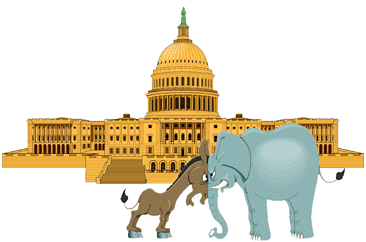Liberals have been an endangered species in Indiana since the 1960's. My home state never had much tolerance for long-haired, marijuana-smoking students who marched on Washington to protest the Vietnam War. Soliciting funds for the "Free Angela Davis" campaign and attending on-campus meetings of the Black Panthers did not win many friends among Hoosiers either. My personal politics were not very popular.
 In 1972, I became old enough to participate in my first federal election, and I happily cast my vote against Richard Nixon's second term. How could the country re-elect a President who had so openly lied to the public? After he won by a landslide, I gave up on the American political process. I would not vote again for sixteen years.
In 1972, I became old enough to participate in my first federal election, and I happily cast my vote against Richard Nixon's second term. How could the country re-elect a President who had so openly lied to the public? After he won by a landslide, I gave up on the American political process. I would not vote again for sixteen years.
In retrospect, turning my back on politics was a mistake. Democracy may not be a perfect form of government, but it does give minorities both the right and the obligation to voice their opinions. By avoiding the ballot box, I was consenting to the policies of America's moral majority. Even if I did not see it this way at the time, I deserve just as much blame for Carter's failed human rights intiatives and the triumph of Reaganomics as do the voters who put conservative politicians in office.
Then, something happened to renew my interest in the democratic process: I became a father in 1987. There is nothing quite like the birth of a child to focus one's attention on the future. If I wanted my daughter to grow up in a world of racial harmony and equal opportunity for minorities, I had to get reinvolved. I joined Democrats Abroad, knowing that my vote would have to represent her until she could go to the polls for herself.
Helping put an end to a dozen years of right-wing American government would not be easy, especially as an émigré. In 1988, I supported Michael Dukakis in a losing effort. Four years later, Paul Tsongas was my choice. Unfortunately, he never made it past the primaries, so I raised funds and voted for Bill Clinton instead. This time, the Democrats won, and I found myself a member of the new majority.
For the next two years, I headed up fund-raising for Democrats Abroad in Japan (DAJ). I also helped Greenpeace launch their local membership program, and assisted the Japan HIV Center in efforts to attract donations. The liberal in me was rediscovering its voice, as was the politician.
In 1994, I was elected to a two-year term as DAJ Vice Chair. I've since had the pleasure of meeting Walter Mondale, Jesse Jackson, and Al Gore, and I was invited to the Democratic National Convention in Chicago in 1996. It is here, in the meeting and greeting and networking of a major party, that real politics takes place. And it is at the polls where it culminates. President Clinton's re-election was a particularly sweet victory, capped by an unforgettable inauguration, which I attended in January 1997. Now I know why a political organization calls itself a "Party."
Seriously, however, I am still very concerned about America's drift away from affirmative action and civil liberties for legal immigrants. The nineties have given rise to a new intolerance for religious, racial, and economic differences. And to me, as a writer, dwindling support for the arts seems symptomatic of the government's hollowness. Changes are needed. Democracy is still imperfect. But at least I'm no longer a powerless outsider to the process.
 In 1972, I became old enough to participate in my first federal election, and I happily cast my vote against Richard Nixon's second term. How could the country re-elect a President who had so openly lied to the public? After he won by a landslide, I gave up on the American political process. I would not vote again for sixteen years.
In 1972, I became old enough to participate in my first federal election, and I happily cast my vote against Richard Nixon's second term. How could the country re-elect a President who had so openly lied to the public? After he won by a landslide, I gave up on the American political process. I would not vote again for sixteen years.

